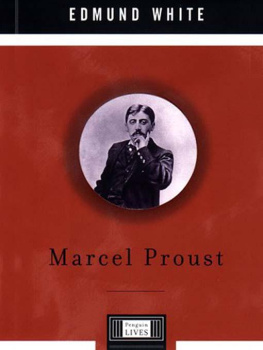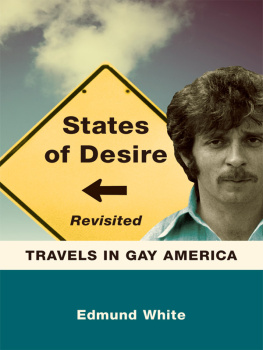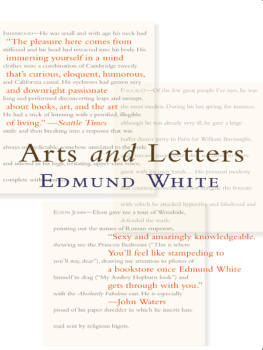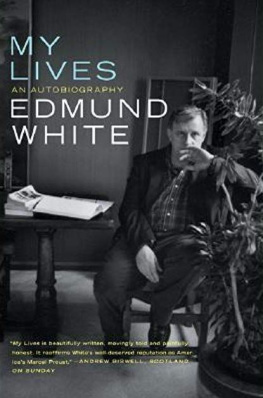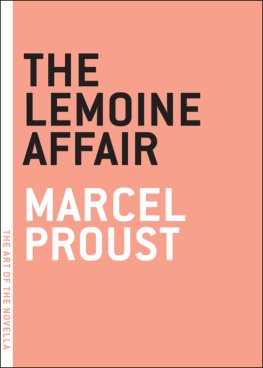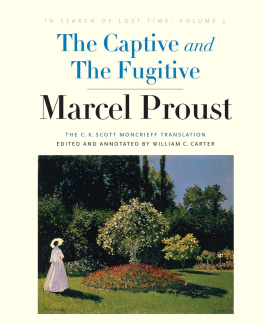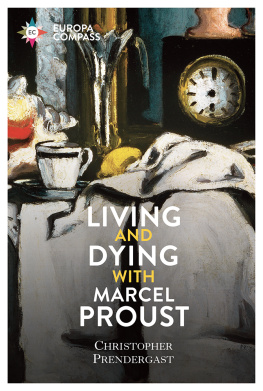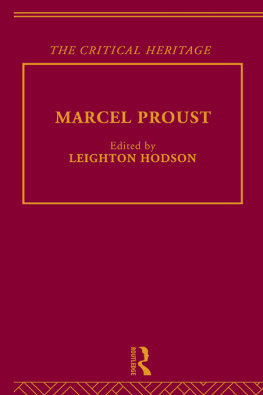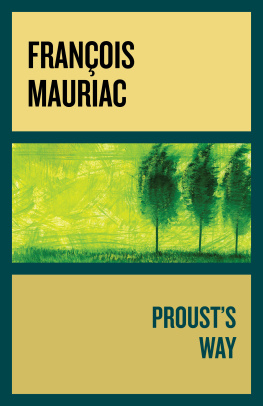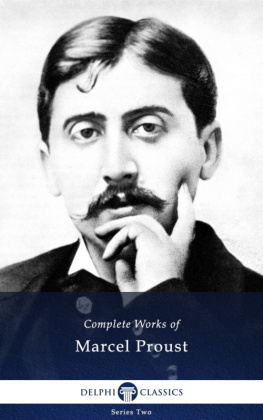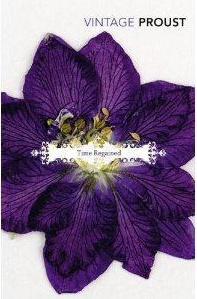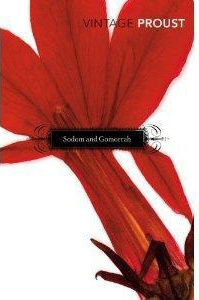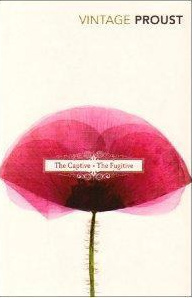Edmund White - Marcel Proust: A Life
Here you can read online Edmund White - Marcel Proust: A Life full text of the book (entire story) in english for free. Download pdf and epub, get meaning, cover and reviews about this ebook. publisher: Penguin (Non-Classics), genre: Non-fiction. Description of the work, (preface) as well as reviews are available. Best literature library LitArk.com created for fans of good reading and offers a wide selection of genres:
Romance novel
Science fiction
Adventure
Detective
Science
History
Home and family
Prose
Art
Politics
Computer
Non-fiction
Religion
Business
Children
Humor
Choose a favorite category and find really read worthwhile books. Enjoy immersion in the world of imagination, feel the emotions of the characters or learn something new for yourself, make an fascinating discovery.
- Book:Marcel Proust: A Life
- Author:
- Publisher:Penguin (Non-Classics)
- Genre:
- Rating:4 / 5
- Favourites:Add to favourites
- Your mark:
- 80
- 1
- 2
- 3
- 4
- 5
Marcel Proust: A Life: summary, description and annotation
We offer to read an annotation, description, summary or preface (depends on what the author of the book "Marcel Proust: A Life" wrote himself). If you haven't found the necessary information about the book — write in the comments, we will try to find it.
Marcel Proust: A Life — read online for free the complete book (whole text) full work
Below is the text of the book, divided by pages. System saving the place of the last page read, allows you to conveniently read the book "Marcel Proust: A Life" online for free, without having to search again every time where you left off. Put a bookmark, and you can go to the page where you finished reading at any time.
Font size:
Interval:
Bookmark:
This is a work of fiction. Names, characters, places, and incidents are either the product of the authors Imagination or are used fictitiously, and any resemblance to actual persons, living or dead, business establishments, events or locales is entirely coincidental.
The Penguin Putnam Inc. World Wide Web site address is
http://www.penguinputnam.com
to Marie-Claude de Brunhoff
I N E NGLAND not long ago a survey of writers and critics revealed that the twentieth-century novelist they most admiredand who they thought would have the most enduring influence on the next centurywas Marcel Proust. Certainly the madeleine moistened by herbal tea has become the most famous symbol in French literature; everyone refers to sudden gusts of memory as Proustian experiences. Snobs like to point out that if the Prousts had been better-mannered and not given to dunking, world literature would have been the poorer for it. Even those who havent read Proust speak of him freely and often.
Studying him, of course, can have a disastrous effect on a young writer, who either comes under the influence of Prousts dangerously idiosyncratic and contagious style or who feels that Proust has already done everything possible in the novel form. Even Walter Benjamin, who became Prousts German translator, wrote the philosopher Theodor Adorno that he did not want to read one more word by Proust than was actually necessary for him to translate because otherwise he would become addictively dependent, which would be an obstacle to his own production.
Graham Greene once wrote: Proust was the greatest novelist of the twentieth century, just as Tolstoy was in the nineteenth.... For those who began to write at the end of the twenties or the beginning of the thirties, there were two great inescapable influences: Proust and Freud, who are mutually complementary. Certainly Prousts fame and prestige have eclipsed those of Joyce, Beckett, Virginia Woolf and Faulkner, of Hemingway and Fitzgerald, of Gide and Valry and Genet, of Thomas Mann and Bertolt Brecht, for if some of these writers are more celebrated than Proust in their own country, Proust is the only one to have a uniformly international reputation. The young Andrew Holleran, who would go on to publish the most important American gay novel of the seventies, Dancer from the Dance , wrote a friend eight years earlier: Robert, much has happened: That is, I finally finished Remembrance of Things Past and I dont know what to saythe idea that Joyce ended the novel is so absurd; its Proust who ended the novel, simply by doing something so complete, monumental, perfect, that what the fuck can you do afterwards?
Joyce met Proust once and they exchanged scarcely a word, even though they shared a cab together (neither had read the other). Beckett wrote a small critical book about Proust; Woolf admired Proust so intensely that she felt swamped by his genius. Gides bitterest regret was that as a founder of a fledgling but already prestigious publishing house, he turned down Swanns Way , the first volume of Prousts masterpiece (he thought of Proust as a superficial snob and a mere reporter of high-society events). Genet began to write his first novel, Our Lady of the Flowers , after reading the opening pages of Prousts Within a Budding Grove . Genet was in prison and he arrived late in the exercise yard for the weekly book exchange; as a result he was forced to take the one book all the other prisoners had rejected. And yet once hed read the opening pages of Proust he shut the book, wanting to savor every paragraph over as long a period as possible. He said to himself: Now, Im tranquil, I know Im going to go from marvel to marvel. His reading inspired him to write; he hoped to become the Proust of the underclass.
And yet Proust was not always so appreciated, and even his chief defenders were capable of making snide remarks about him. Robert de Montesquiou (whose arch manners and swooping intonations Proust loved to imitate and whose life provided Proust with the main model for his most memorable character, the baron de Charlus) said that Prousts work was a mixture of litanies and sperm (a formula that he considered to be a compliment). Gide accused him of having committed an offense against the truth (Gide was irritated that Proust never acknowledged his own homosexuality in print nor ever presented homosexual inclinations in an attractive light). Lucien Daudet, a young writer with whom Proust had an affair (Proust liked artistic young men with mustaches and dark eyes: that is, those who resembled himself), at one point told Cocteau that Proust was an atrocious insect. Luciens father, Alphonse Daudet, one of the most celebrated writers of the generation before Prousts, though now largely forgotten, announced, Marcel Proust is the devil! He might well have taken such a position, since it was Prousts seven-volume novel, Remembrance of Things Past (in recent editions, translated more literally as In Search of Lost Time ), that surpassedindeed, wiped outthe fiction written in the two decades before him. Who today reads Anatole France, Paul Bourget, Maurice Barrs, or even Alphonse Daudet? Paul Claudel, the arch-Catholic poet and playwright, described Marcel as a painted old Jewess. In New York during the 1970s one popular T-shirt, using the Yiddish word for a female gossip, brandished the slogan Proust Is a Yenta!
These insults, many of them handed out by people who on alternate days adored Proust, were neutralized by an issue of La Nouvelle Revue Franaise , Frances best literary magazine at the time, that was entirely dedicated to Proust. It came out in 1923, just a year after Prousts death, and contained photos of the dead master, previously unpublished snippets from his pen, and evaluations from critics, French but also from nations all over the world. Most touching were the many personal testimonies. The poet Anna de Noailles, herself a monument to egotism, praised Proust for his... modesty. (The duc de Gramont, one of Prousts highest-born friends, once remarked that aristocrats invited Proust for country weekends not because of his art but because he and Anna de Noailles were the two funniest people in Paris.)
Everyone had a sharp memory to share. Jean Cocteau, the poet-playwright-impresario-filmmaker (Beauty and the Beast) , recalled Prousts voice: Just as the voice of a ventriloquist comes out of his chest, so Prousts emerged from his soul. The writer Lon-Paul Fargue remembered seeing Proust towards the end of his life, completely pale, with his hair down to his eyebrows, his beard, so black it was blue, devouring his face.... Fargue noticed the long sleeves covering frozen hands, the Persian, almond-shaped eyes. He looked like a man who no longer lives outdoors or by day, a hermit who hasnt emerged from his oak tree for a long time, with something pained about the face, the expression of suffering that has just begun to be calmed. He seemed possessed by a bitter goodness. A young aristocratic woman recalled that when she was a girl she was supposed to be presented to him at a ball, but the great writer, livid and bearded, wearing the collar of his overcoat turned up, stared at her with such intensity that when they were finally introduced she was so frightened she nearly fainted.
One of Prousts ex-lovers and his most constant friend, Reynaldo Hahn, the composer, recalled that soon after he met Proust they were walking through a garden when suddenly Proust stopped dead before a rosebush. He asked Hahn to continue walking without him. When at last Hahn circled back, after going around the chteau, I found him at the same place, staring at the roses. His head tilting forward, his face very serious, he blinked, his eyebrows slightly furrowed as though from a passionate act of attention, and with his left hand he was obstinately pushing the end of his little black mustache between his lips and nibbling on it.... How many times Ive observed Marcel in these mysterious moments in which he was communicating totally with nature, with art, with life, in these deep minutes in which his entire being was concentrated.... Typically, Proust also invoked this very scene, but said that inhaling the moment was ineffectual; only the sudden, unprompted awakenings of memory, triggered by something illogical and unforeseen (the madeleine, for example), could invoke the past in its entirety.
Next pageFont size:
Interval:
Bookmark:
Similar books «Marcel Proust: A Life»
Look at similar books to Marcel Proust: A Life. We have selected literature similar in name and meaning in the hope of providing readers with more options to find new, interesting, not yet read works.
Discussion, reviews of the book Marcel Proust: A Life and just readers' own opinions. Leave your comments, write what you think about the work, its meaning or the main characters. Specify what exactly you liked and what you didn't like, and why you think so.

